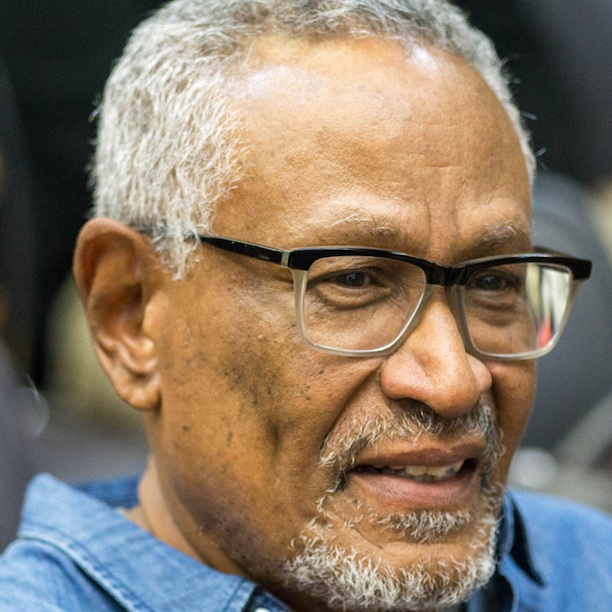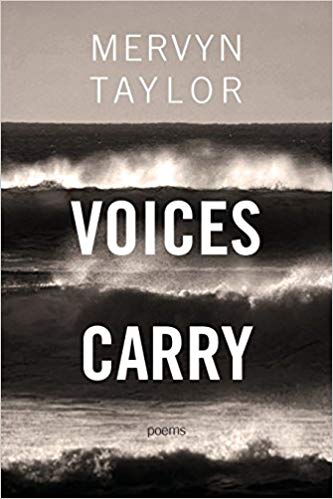|
Getting your Trinity Audio player ready...
|
Reading Time 5 mins
January 7, 2019
VOICES CARRY
by Mervyn Taylor
102 pp. Shearsman Books.
In this sixth collection of poems from Mervyn Taylor–a seasoned poet, whose brilliant, incisive, powerful first collection I had the pleasure of reviewing—the verse abounds with intensity, subtlety and a preoccupation with everyday matters, large and small.
Through humor and irony filtered into language that is both sublime and quotidian, the poet tackles a myriad of topics such as the disappearance of his favorite childhood spaces in Belmont, the rising violence in his native land of Trinidad, gentrification in Brooklyn, and the weight of memory. Taylor is truly an eclectic poet whose range and depth is evident throughout this offering. In a poem aptly titled, “The Lesson,” a young man from Brooklyn, who because of his fear of being seen walking down the street holding hands with his male friend in Lagos, keeps “finding ways to let go, pointing in surprise/ at every little thing” he sees until the African shouts, “Look a tiger! /’Where?’ asks the frightened man, grabbing his arm. ‘Nowhere. But if one comes. It’s okay to hold my hand.'”

In another poem, “Where Do They Go”, Taylor confronts difficult questions such as “When we say those near death/are traveling, what does it mean?”
The collection is packaged into three parts. In the first section you get a series of poems set in his native Trinidad and in the second section the poems revolve around the world of his adopted home, Brooklyn. In the third and final section, the poet fuses or contemplates on both worlds.

In section one the poet celebrates the voices he hears in his native Port of Spain. There is a sense of loss and nostalgia for what is gone but still felt keenly and closely by the poet. In the poem, “Bad Dream” Taylor invokes his “troubled island” to go back to its “peaceful ways” when life was “mostly about nesting” and:
everyone had arms held out to catch
You, and the ground was as soft
as breadfruit patterns. Go back….
to sleep, take up your dream
at the point before the fire started
when what fell was dew, not ashes…
That fire he speaks of is the violence and destruction that blight his beautiful homeland. It is everywhere and he can only yearn or long for it to end as in “Enough” where he ponders, “What if, suddenly, the spate of killings/were to end……/we might begin to forget the sound/of a neighbor being strangled, the thief’s /warning to his partner, Enough!”
In “Alma’s Advice” ,he doesn’t recognize the people of his country anymore, these strangers who “are running wild in our country, darts/for eyes. clubs for fists, hit lists/embedded in text messages.”

The collection is very much grounded in the present reality of the Caribbean landscape as it holds a mirror to the violence and high murder rates found throughout these “tourist archipelagos”. The latest Index Mundi International Homicides Country Ranking listing countries with the highest homicide rate per capita of 100,000 includes 8 Caribbean countries in the top 20! In poems from “Death in
But despite the seeming blight, we see the love affair and the deep attachment that the poet feels for his birthplace as in the poem “A Kind of Valentine” where he asks in the epilogue: “When you come to the place in the world where you think you belong, how do you know? By the local who understand your language? By the freedom you feel?”
This is a central question that runs throughout the collection. This notion of place; what connects us to where we are, what we call home whether that, as in the poet’s case is Trinidad or Brooklyn, his adopted homeland. His answer to that question is the very title of the collection, Voices Carry, a testament to the power of memory as contained in the voices we hear or recall.
We hear many voices; the voices of grandmothers and mothers as in the poem “Those Who Stayed”. These women “lodge their complaints :/ everywhere there is so much war/… did you hear that woman scream,/ whose boyfriend set her on fire?” We see them caring for each other as, “They’ll exchange pelau for fish” or enquire, “How are the children, one asks, / the ringworm, it gone?” We also feel their suffering and pain as in the same poem, the voices worry that “termites are eating both their/houses, and the boy in America/for some reason, hasn’t called.”
Taylor’s collection has a Whitmanesque quality as, in deceptively simple but passionate language; it celebrates the exuberant and expansive voices of everyday people and their experiences. In “Pop, Fathers, Uncle”, the poet’s reverence for community, respect for elders—even those not fully aware of their age–and those things that bind us is echoed in the following lines: “These are my new names, given to me by strangers. /suddenly I am related to the young man who moves over in the/ taxi to the girl clerking in the hardware store who asks, Uncle, /you getting through?” In these chance encounters Taylor underscores our common humanity and extends Lord Nelson’s “[all ah we is one] ‘Family’ ” as a signal of national hope while pondering: “How do all these people think me family, from the tall-hatted Rasta smoking his cheroot, to the Indian who shaved fins from the sliced carite in my bag.”
In “Three from the Garment District”, the poet presents us voices from the working-class in three vignettes titled, “Charlie”, “Dapper”, and “By the Piece”. Each paints a harrowing picture of life in an industry that is often rife with abuse of poor and marginalized, often immigrant, workers.

Taylor celebrates the voices that he hears; they are what sustain his memory. He meditates on Belmont where he grew up as well as Brooklyn where he now lives. In “Belmont, the Beginning” he recalls “the foothills of the mountains”, “this Belmont was the enclave where/police could never find their quarry/ where Spanish, Indian and Black/would mingle and marry curly-headed”. His native land, in his eyes, then, may well have embodied the notion of multiculturalism long before it became fashionable. Though Trinbago has changed it still remains etched forever in his memory.
The poet flits between the island of Trinidad and Brooklyn, where he equally laments the loss of a world that he knew in Brooklyn. In “Nostrand Avenue” he bemoans the passing of his old neighborhood haunts:
Now where Nostrand intersects with
Fulton, down from where the crowd
Crossed between Terrace and the Fightback
on Saturday nights, hipsters sit
eating roti and drinking lattes.
Taylor’s poems are in the tradition of two renowned Caribbean poets, Derek Walcott, and Kamau Braithwaite. They paint his Island into the world thru words, elevating the voices of the people and his native landscape,- “full of cock crows and whispering leaves… the harbor quietly rocking your boat;”- transmuting the
Lennel George, a retired NYC High School Principal who teaches at CW Post, Long Island, is a Kittitian with a deep interest in Caribbean Literature and has traveled throughout the region, including Cuba.

Hello Lennel,
This is Gary Adolfson – from long ago in the past millenium, from 8th floor Hartley. I read a lot of GBS back then, & GK Chesterton. You read Yeats & Joyce. I dragged you to Shaw plays, you dragged me to Shakespeare. Not surprised I found you through poetry.
Where do you live? Are you in Brooklyn? Long Island? The Coronavirus is bad in NYC – how are you doing? I hope you’re OK.
I’m in Oakland, CA – we’re locked down, but so far can’t complain.
Warning: I am a dinosaur in social media tech – never been on facebook, twitter, &c – was even off email for a few years. Coronavirus prodded me to start up again w/ this new email addr (garyg43ewr77@icloud.com).
It’d be great to hear from you, & hear that you’re well.
Your old friend,
Gary